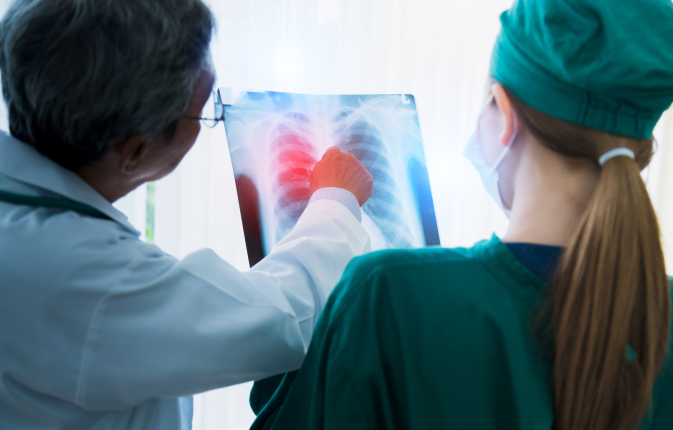Pulmonary (lung) Nodules
Pulmonary Lung Nodules
Many people have lung nodules. These abnormal growths are rarely cancerous. Respiratory illnesses and infections can cause nodules to form in the lungs. Most lung nodules are not a sign of lung cancer and don’t require treatment. On X-rays or scans, these growths may look like a shadow or spot on the lung.
What is a Lung Nodule?
A lung (pulmonary) nodule is an abnormal growth that forms in a lung. You may have one nodule on the lung or several nodules. Nodules may develop in one lung or both.
Most lung nodules are benign (not cancerous). Rarely, pulmonary nodules are a sign of lung cancer.
Lung nodules show up on imaging scans like X-rays or CT scans. Your healthcare provider may refer to the growth as a spot on the lung, coin lesion or shadow.

How Common are Lung Nodules?
Lung nodules are very common. Up to half of adults who get chest X-rays or CT scans have them.
Are Lung Nodules a Sign of Lung Cancer?
About 95% of lung nodules are benign. Many things can cause benign lung nodules, including infections and scarring. If you have a pulmonary nodule, your healthcare provider may want to perform additional tests to determine the cause and rule out lung cancer.
What are the Risk Factors for Lung Nodules?
Anyone can develop pulmonary nodules. A nodule is more likely to be cancer if you:
- Are a former or current smoker.
- Are older than 65.
- Have a family history of cancer.
- Received radiation therapy to the chest.
- Had exposure to asbestos, radon or secondhand smoke.
What Causes Lung Nodules?
When an infection or illness inflames lung tissue, a small clump of cells (granuloma) can form. Over time, a granuloma can calcify or harden in the lung, causing a noncancerous lung nodule.
A neoplasm is an abnormal growth of cells in the lung. Neurofibromas are a type of noncancerous neoplasm. Types of malignant (cancerous) neoplasms include lung cancer and carcinoid tumors.
Other causes of noncancerous lung nodules include:
- Air irritants or pollutants.
- Autoimmune diseases, such as rheumatoid arthritis and sarcoidosis.
- Fungal infections like histoplasmosis.
- Respiratory system infections, such as tuberculosis (TB).
- Scar tissue..
Contact your healthcare provider if you have lung nodules and start to experience:
- Chest pain.
- Chronic cough or coughing up blood.
- Fatigue.
- Hoarseness.
- Loss of appetite and unexplained weight loss.
- Recurring respiratory infections like bronchitis or pneumonia.
- Shortness of breath (dyspnea) or wheezing.
What are the Symptoms of Lung Nodules?
Small lung nodules rarely cause symptoms. If the growth presses against the airway, you may cough, wheeze or struggle to catch your breath.
Also rarely, you could experience signs that might indicate early stage lung cancer (cancer that hasn’t spread outside the lung).
How are Lung Nodules Diagnosed?
Most people find out they have a lung nodule after getting an imaging test in preparation for a procedure or another purpose. The findings are often a surprise.
If an imaging test shows a lung nodule, your healthcare provider may recommend active surveillance. In six to 12 months, you get another CT scan. Nodules that stay the same size during a two-year surveillance period are not likely to be cancer. You may be able to stop getting CT scans.
Your provider may order further tests if the nodule is large (more than half an inch, or about 12 millimeters) or it grows. These tests include:
- Bronchoscopy: While you’re sedated, your provider threads a thin tube (bronchoscope) down your throat into the lung. A tiny surgical instrument on the end of the scope snips and retrieves a tissue sample from the nodule. A lab analyzes this biopsy sample for abnormal cells.
- CT scan-guided biopsy: For nodules on the outer part of the lung, your provider uses CT images to guide a thin needle through the skin and into the lung. This needle biopsy takes tissue samples from the nodule to examine for abnormal cells.
- Positron emission tomography (PET) scan: A PET scan uses a safe, injectable radioactive chemical and an imaging device to detect diseased cells in organs.
Schedule Your Appointment
We are accepting new patients! Request an appointment today to be seen by top pulmonologist in Las Vegas, Dr. Kevin Tsui.
Request Appointment